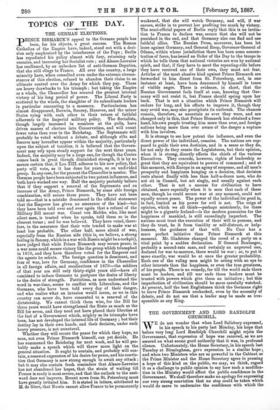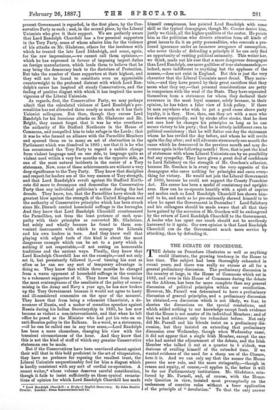THE GOVERNMENT AND LORD RANDOLPH CHURCHILL.
do not wonder that when Lord Salisbury expressed, in his speech to his party last Monday, his hope that before very long Lord Randolph Churchill might rejoin the Government, that expression of hope was received, as we are assured on what seems good authority that it was, in profound silence. Unfortunately, the Home Secretary, in his speech last Tuesday at Birmingham, gave expression to a similar hope ; and when two Ministers who are so powerful in the Cabinet as the Prime Minister and the Home Secretary agree in pressing a hope of this kind on the public, we may, we think, regard it as a challenge to public opinion to say how such a modifica- tion in the Ministry would affect the public confidence in the Government. We shall therefore make no apology for expressing our very strong conviction that no step could be taken which would do more to undermine the confidence with which the
present Government is regarded, in the first place, by the Con- servative Party as such ; and, in the second place, by the Liberal Unionists who give it their support. We are perfectly aware that Lord Randolph Churchill has a few personal supporters in the Tory Party, some of whom admire him for the violence of his attacks on Mr. Gladstone, others for the insolence with which he treated the late Lord Iddesleigh, and some, again, for the raw impressions,—we cannot call them opinions,— which he has expressed in favour of imposing import duties on foreign manufactures, which leads them to believe that he may bring the democracy back to the doctrines of Protection. But take the number of these supporters at their highest, and they will not be found to constitute even an appreciable counterweight to the profound distrust with which Lord Ran- dolph's career has inspired all steady Conservatives, and the feeling of positive disgust with which it has inspired the more vigorous of the Liberal Unionists.
As regards, first, the Conservative Party, we may perhaps admit that the calculated violence of Lord Randolph's per- sonalities has not alienated them nearly as much as it has their Unionist colleagues. But then, though they excuse Lord Randolph for his ferocious attacks on Mr. Gladstone and Mr. Bright, they cannot forget that it was he who overthrew the authority of Sir Stafford Northcote in the House of Commons, and compelled him to take refuge in the Lords ; that it was he who formed an alliance with the Parnellite Members and spurred them on to many an act of obstruction in the Parliament which was dissolved in 1885; nor that it is he who has accustomed the Tory Party to regard a sudden change from violent language used on one side, to language quite as violent used within a very few months on the opposite side, as one of the most natural incidents in the career of a Tory statesman. Now, none of these achievements are without a very deep significance to the Tory Party. They know that discipline and respect for leaders are of the very essence of Tory strength, and that Lord Randolph's revolt against Sir Stafford North. cotedid more to decompose and demoralise the Conservative Party than any individual politician's action during the last decade. They know, too, that the Parnellites have struck the greatest blow against the strength of the United Kingdom and the authority of Conservative principles which has been struck since Mr. Disraeli carried household suffrage in the boroughs. And they know that Lord Randolph Churchill countenanced the Parnellites, not from the least pretence of such sym- pathy with their principles as converted Mr. Gladstone, but solely and wholly because he found in them con- venient instruments with which to scourge the Liberals and his own leaders in turn. And they know well that playing with edged tools of this kind is about the most dangerous example which can be set to a party which is nothing if not respectable,—if not resting on honourable traditions and the ancient ways. Finally, they know that Lord Randolph Churchill has set the example,—and not only set it, but persistently followed it,—of turning his coat as often as he can see any sort of temporary advantage in doing so. They know that within three months he changed from a warm opponent of household suffrage in the counties to a vehement supporter of it. They know that from being the most contemptuous of the assailants of the policy of econo- mising in the Army and Navy a year ago, he has now broken up the Tory Government because it would not agree to hasty and ill-considered economies on the spur of the moment. They know that from being a vehement Chauvinist, a de- nouncer of Russia, and a maker of sensation speeches against Russia during his Indian Secretaryship in 1885, he has now become as violent a non-interventionist, and that when he left office he posed as the Minister who had put his veto on an anti-Russian policy in the Balkans. In a word, as a statesman, —if he can be called one in any true sense,—Lord Randolph has been a mere chameleon, changing his view with the transient circumstances of the hour. And they know that this is not the kind of stuff of which any genuine Conservative statesman can be made.
But if the Conservatives have been convinced almost against their will that in this bold proficient in the art of vituperation, they have no pretence for reposing the smallest trust, the Liberal Unionists unquestionably feel for him a disgust which is hardly consistent with any sort of cordial co-operation. A recent writer,* whose volume deserves careful consideration, though it fails to insist sufficiently on those cynical recanta- tions of opinion for which Lord Randolph Churchill has made
• Lord Randolph Churchill ra Study rf English Democracy. By John Beattie Crozier. London Swan Sonnensohein and Co. himself conspicuous, has painted Lord Randolph with some skill as the typical demagogue, though Mr. Crozier denies him, justly we think, all the higher qualities of the orator. He paints him as the politician who diverts attention from all kinds of great issues to Sic it on petty personalities, who conceals a pro- found ignorance under an immense arrogance of assumption, who never thinks of defending a principle if he can only find an opportunity of venting political animosity. This writer has, we think, made out his case that a more dangerous demagogue than Lord Randolph, one more guiltless of true statesmanship,— indeed, more indifferent to anything but the applause of the masses,—does not exist in England. But this is just the very character that the Liberal Unionists most dread. They main- tain,—and they have proved by their great sacrifices that they mean what they say,—that personal considerations are petty in comparison with the weal of the State. They have separated themselves from a statesman for whom they declared their reverence in the most loyal manner, solely because, in their opinion, he has taken a false view of Irish policy. If there be men anywhere who wish to put a good cause above party loyalty, it is they. How, then, can they act with a man who has shown repeatedly, and by stroke after stroke, that he does not care how he changes his principles so long as he can secure victory to his party ; that be is utterly indifferent even to political consistency ; that he will flatter One day the statesman whom he has reviled the day before, and whom he will revile again the day after; and will advocate strenuously one month the cause which he denounced in the previous month and may de- nounce again in the following month? Now, that is just the kind of statesman with whom Liberal Unionists can by no possibility feel any sympathy. They have given a great deal of confidence to Lord Salisbury on the strength of Mr. Goschen's adhesion, because Mr. Goschen is in every way the very opposite of the demagogue who cares nothing for principles and cares every- thing for victory. He would not join the Liberal Government of 1880, because he could not support the County Franchise Act. His career has been a model of consistency and upright- ness. How can he co-operate heartily with a spirit of caprice and malice such as Lord Randolph Churchill has shown him- self to be, and such as he pre-eminently showed himself to be when he upset the Government in December ? Lord Salisbury and his colleagues should be made aware that all that they have gained by the accession of Mr. Gosehen will be endangered by the return of Lord Randolph Churchill to the Government. A leader who has upset one coach should not be needlessly harnessed to it again. Our own opinion is that Lord Randolph Churchill can do the Government much more service by attacking, than by defending it.



































 Previous page
Previous page